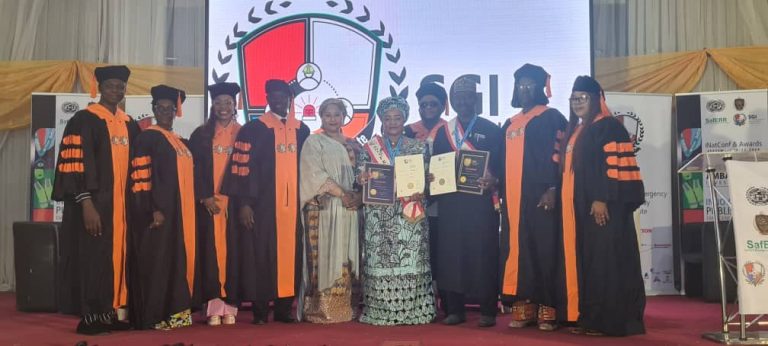Chairman, House of Representatives’ Committee on Safety Standards and Regulations, Hon. Sulaiman Abubakar Gumi on Friday underscored the need to adoption of e-governance and policy framework, e-health and smart healthcare, Artificial Intelligence and applications, precision and intelligence in all sectors of the economy.
Hon. Gumi stated this while delivering a keynote address on Public Safety, Emergency Management and Environmental Sustainability during the International Conference & Awards on Health, Safety, Security and Emergency Response Ready (SafERR) Global Institute, held in Lagos State.
Hon. Gumi who was conferred with the Fellow of the Institute, averred that: “Public Safety is the cornerstone of a functioning society. It ensures that our communities are protected from crime, disasters, and accidents.
“However, public safety extends beyond mere response; it encompasses proactive measures, community engagement, and the creation of environments where people feel secure.”
Other Fellow Awardees are: Deputy Chairman House Committee on Safety Standards and Regulations, Hon. Hon Harrison Anozie Nwadike; as well as the Clerk, House Committee on Safety Standards and Regulations, Mrs. Ike-Onuigbo, Chinyere Gift who doubles as Clerk, Nigeria /Malta Parliamentary Friendship Group and Departmental Administrator of the Chamber Services Department having served in various capacity in the past in Committees such as: Insurance and Actuarial Matters, Nigeria /Serbia Parliamentary Friendship Group, Gas, Petroleum Industries Bill (PIB), Foreign Affairs, Inter-Parliamentary Relation, Marine Transport and Health.
She also served in the Offices of the President of the Senate, Deputy Clerk to the National Assembly and Director, Chamber Services Department and several other offices.
Speaking further, Hon. Gumi said: “As we advance in technology and data analytics, we must use these tools not only to predict and prevent threats but also to foster trust and cooperation between law enforcement and the communities they serve.
“Emergency Management is the structured approach to handling disasters and crises. It involves preparation, response, recovery, and mitigation. Effective emergency management requires robust planning and coordination across all levels of government and community organizations.
“The lessons learned from past events underscore the importance of having resilient infrastructures, clear communication channels, and the ability to adapt to rapidly changing situations. By integrating technological innovations and fostering strong public-private partnerships, we can enhance our preparedness and response capabilities.
“Environmental Sustainability is increasingly recognized as an essential component of public safety and emergency management. Our environmental health directly affects our vulnerability to natural disasters and the overall quality of life.
“Sustainable practices—such as reducing carbon emissions, conserving resources, and protecting ecosystems—are not just ethical imperatives but practical necessities. Climate change, for instance, intensifies the frequency and severity of extreme weather events, making it imperative that we adopt strategies that mitigate environmental impact and build resilience against such threats.
“The intersection of these fields highlights the need for a holistic approach to safeguarding our future. For instance, integrating sustainable practices into urban planning can enhance resilience against natural disasters. Similarly, incorporating public safety considerations into environmental policies ensures that both people and ecosystems are protected.
To ensure that there is a place for citizens engagement, promotion of IT governance and ethics, industrial revolutions, building of critical National Infrastructure, improvement of Digital economy, embracing future of work (Ergonomics and Smart Culture, in all scaling up innovative skills, Youth innovation and sustainable productivity.
“To further note that there is need to advance e-governance and policy framework, e-health and smart healthcare, Artificial Intelligence and applications, precision and intelligence in all sectors of the economy (Agriculture, security, safety, health, surveillance, education, etc).”
According to Hon. Gumi, “through these innovations we shall have Smart, Secured, Safe and Sustainable environments for the public/citizens at large.
To achieve the feat, Hon. Gumi observed that, “advancing in Public Safety, Emergency Management, and Environmental Sustainability requires collaboration, innovation, and a commitment to long-term thinking.
“By working together and leveraging our collective expertise, we can build more resilient communities, protect our environment, and ensure a safer future for generations to come.”
